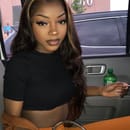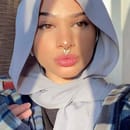Transitioning from a young girl into womanhood is challenging. Society has encouraged the feeling that we are in a constant battle with our own people. Imagine growing up with anxiety or depression because of how you look and how society expects women of the same ethnicity as you to look. We were created one way, criticized and are encouraged to look another. This is how it feels to be a Black girl.
It is believed that we are equally compared to the rest of society, yet by the age of four, I already wanted to have characteristics of a Caucasian girl. I distinctly remember drawing pictures of myself with blonde hair and light skin. I remember being five years old and admiring the white woman portrayed on television and hoping that someday, I’d resemble her. I remember being six and trying to flip my tightly coiled hair like my friends. I was seven years old, lying about my cultural background. At the time, all of the little Black girls my age were doing it; it was the in thing to be mixed. The same pattern continued between the ages of eight and nine. When I reached the age of ten, that’s when things changed a little bit. I started to develop friendships with children I could relate with.
I began to find myself, but I noticed how people would compare and treat me. When I started middle school, being light-skinned or dark-skinned played a big part in how pretty you were considered. That’s when I started to become self-conscious of my skin tone. The majority of the Black boys would make what they thought were “jokes” or discriminate against you if you were a dark-skinned girl.
I was now twelve years old and social media played a significant part in how Black women were portrayed in society. We were often over-sexualized while also being seen as “loud”, “ghetto” or “ratchet”. We were often seen wearing anything but our own hair. This tied into what I thought of myself. The natural beauty of a Black woman was the furthest from attractive. Our nappy hair was unprofessional and our chocolate skin was a threat. We were afraid to be ourselves, and society was afraid to let us. Black women are directly at war with one another, and because of this, we stray away from who it is that we truly are. The characteristics of how we act are often associated with the colour of our skin. Being light-skinned meant you are automatically more attractive than darker skin tones and are typically men’s first choice.
I was now fourteen and it seemed to be common for Black girls to put down their own people. At the beginning of freshman year, I decided to go completely natural, in terms of my hair. No more pressing, straightening or adding chemicals to my hair. Inspired by my mother, I dreaded my hair. Many people told me that I’d be looked at differently if I did so. I was, but at the time I didn’t care. This was a time when I really gained knowledge of how beautiful women of the same ethnicity as I was. I wanted to prove a point; I wanted the Black girls my age to know that you didn’t need weaves, extensions, perms or relaxers to fit the standards society has set for us to follow or to feel beautiful.
I felt as if a lot of girls at the time felt out of place as I did. However, it was different if you were a Black girl simply because it’s hard to embrace our natural beauty when we are constantly bombarded with what society says a beautiful Black woman is. As Black females, we should learn how to carry ourselves as a Black woman should. We should be taught how to manage and take care of our hair, and most importantly, we should be taught how to love ourselves, despite the tone of skin or what society says. This is where we fall. A large percentage of girls are raised and taught not to be happy with nappy, not to love the melanin in their skin, but at all times being the woman that society is comfortable with, rather than just being themselves.
Growing up into the woman I am today, my entire life has been about my culture and who we truly are as a people. Growing up in an era where only European standards of beauty are being celebrated has made it a constant battle to love and be at peace with who I truly am. It is very easy for one to begin to question why they were born this way or what they have done to be treated this way. These questions used to cross my mind on a daily basis. Now, the only thing that crosses my mind is how fortunate and lucky I am to be who I am today.
I am now nineteen and I feel as if I’ve gained a lot of knowledge and experience when it comes to the way I’ve been treated or have felt. At this point in time, I know how it feels to be treated differently or expected to execute less than others because of my skin colour, and how it feels to be laughed at or taunted because you don’t look like everyone else. I know how it feels for people to perceive you as a threat because of the colour of your skin, or even to be four years old and told you can’t play with someone because of, again, the colour of your skin. Experiencing these tough times in my life has taught me the amount of hatred one can have towards another race. Overcoming these obstacles has only helped me find my internal self, and it has made me embrace the beauty that lies within my people. It’s helped me become a contributing voice in society. This entire experience made me realize How It Feels To Be A Black Girl.



